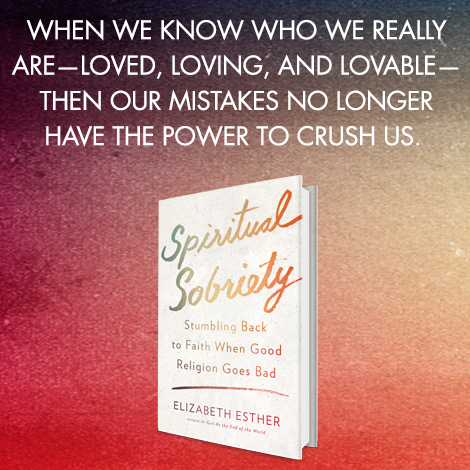Editorial Note: The following is reprinted with permission from Eleanor Skelton’s blog. It was originally published on June 2, 2017.
I love so much of Elizabeth Esther’s writing because what she says fits my experiences in unhealthy churches.
I preordered her book Spiritual Sobriety: Stumbling back to faith when good religion goes bad in spring of last year, around the same time that I interviewed her on my blog.
Recently I re-read my copy before sending it off to a couple of friends who are also unpacking unhealthy spiritual things they learned.
Elizabeth talks about how belief in God can become an addiction, and worship just another way to get a high–she calls this a “transactional use of God.”
She also doesn’t blame us, the religious addicts, for this.
“We didn’t make a conscious choice to treat religion this way. At whatever age we veered off track, we were just doing the best we could.” (p. 11)
“How were we supposed to know there were healthy ways of approaching God when the people we admired taught us that living intentionally with God looked like anything but freedom?” (p. 12)
She argues in the first few chapters that it’s basically a process addiction–an addiction to a behavior rather than a substance.
Elizabeth also says we should pay attention to that drained feeling, the letdown after religious services and events.
“This letdown is an important indicator that something is wrong. If we behaved in healthier ways, we wouldn’t feel the gnawing despair of having spent ourselves on a mirage.” (p. 8-9)
She says that a loving God will respect our boundaries (p. 61), and how she is learning to embrace a sense of mystery and be okay with not knowing everything. And she cautions us against buying into the American idea that our self-worth is tied to our productivity and how that leaks into our spiritual practices, too.
Religious addicts, according to her research, often have problems with excessive daydreaming and living in obsession, fantasy, and magical thinking.
This really resonated with me since I used to use fiction as my drug. Being a bookworm in an unhealthy household wasn’t just me being an adorable, academic kid, it was an escape when I felt like my home was a prison.
Elizabeth also writes about recovering from the shame of a legalistic upbringing, learning to acknowledge a mistake, and move on.
“When I feel myself saying ‘I am a bad person,’ that means I’m internalizing my mistakes,’ she says. ‘I have to remind myself to stop the Shame Brain.'” (p. 78)
“Shame tells us that we are lovable only when we are performing well. Admitting a mistake means admitting we aren’t worthy of love.” (p. 77)
Religious addicts also have the tendency to demand that others believe exactly the same way that they do and feel responsible for saving the world.
“Driven by fear, the religious addict feels responsible for the eternal salvation of every soul. Different beliefs must be confronted (and eradicated!) because they signal a hellish trajectory. In the pursuit of saving the world, the RA behaves as if the ends justify the means. Judgemental rhetoric is a small price to pay for snatching sinners from the fires of Hell, amen?” (p. 89)
We get drawn even further into religious extremism through this thinking.
“For Christians, being lukewarm is almost as bad as not believing at all. We’d rather burn out for Jesus than take the seemingly lazy road of moderation.” (p. 98)
She takes a similar approach to other addiction recovering programs, encouraging recovering religious addicts to avoid trying to fix everything all at once but and resist believing that we have to recover quickly to meet God’s approval.
She references Nadia Bolz Weber, who said, “the sacred rest that is yours never comes from being worthy.”
Once we learn to move away from relying on high intensity feelings and unstable extremes, we can learn healthier ways to cope. Sometimes too much structure is bad for us, too. Elizabeth says that she was raised with so much rigidity that her twelve step recovery program began to harm her (p. 106).
“Whenever we find ourselves slipping into extremes, we need to realize we’re headed toward an unstable state that could compromise our spiritual sobriety.” (p. 107)
These extremes, she explains, might manifest in our lives as
- black and white thinking
- catastrophic forecasts of the future
- attacking tasks with a vengeance
- trying to change things that are entirely out of our control
- staying up too late because we need to get more done, not exercising (or overexercising)
- starving ourselves, overeating
- not letting ourselves reach out for help, not talking about what we’re going through
- paranoia
Religious addicts may be especially prone to relapse when hungry, angry, lonely, or tired.
Here’s some little pieces that resonated with me.
If you are recovering from a legalistic, cult-like church, I’d say read Elizabeth’s book. She’s been there herself and she understands that recovery is a journey.
Significant Quotes:
“I was consuming God. I didn’t have access to chemical substances – we were intensely devout, conservative Christians – so I used what was available: religious beliefs. I habitually “used” God and all things church to numb pain and feel good.” (p. 3)
“Maybe we identify so closely with our sick selves that we don’t think we even deserve merciful loving kindness. Maybe we agree with those who say we need to be punished (especially if we’ve begun to seek spiritual sobriety). Maybe we’re so tired of trying to stop our addictive behaviors that we figure we might as well go full speed ahead.” (p. 28-29)
“Accepting help for my depression was also the first step toward accepting my religious addiction.” (p. 29)
“I saw that my relationship with God wasn’t a partnership, but one based on fear of punishment. No wonder I’d felt abandoned by God: I couldn’t trust Him enough to let Him love me. No wonder I sought relief in secretive behaviors: when I couldn’t find the love I needed from God, I tried to find it elsewhere.” (p. 50)
“This idea–that a human being represents God for you–is a dangerous lie, because if someone controls your concept of God, he controls everything. But all the control and scrupulosity didn’t take away my deep, real need for love. Once out of the cult, I turned my focus to relationships: seeking friendships and romantic love that would fulfill, heal, and make me whole. My emotional intensity enabled me to become deeply intimate with people very quickly. But when someone got too close, I pulled away–true intimacy was terrifying. I was afraid everyone was abusive. Over time, I transferred my abusers’ traits to my concept of God.” (p. 51)
“We feel safe in the presence of nonjudgmental compassion.” (p. 54)
“If we are to achieve spiritual sobriety and live successful, productive lives, we need to meet a God who tells us we’re unconditionally loved and infinitely valued, no matter what we do, accomplish, or feel in one particular moment.” (p. 55)
“Now I know very little about what there is to know about the true God, and I’m learning to accept that reality. I no longer believe there are simple answers to complex questions, but I’m still sure that God is somehow good.” (p. 73)
“But if our mistakes are strong enough to compromise God’s acceptance of us, isn’t that the same as saying our mistakes are stronger than God? This is similar to believing we are born inherently evil. If that were true, then it would mean God created depravity. But just as it is impossible for God to create evil, so it is impossible that our mistakes are stronger than God’s hold on us.” (p. 78)
“Religious addicts are especially prone to self-neglect because Scripture texts are frequently misinterpreted to equate self-hatred with godliness. Calvinistic doctrines like ‘total depravity’ reinforce self-loathing. God intended for us to need Him because the beautiful plans he has for us to find their fulfillment in communion with Him—not because we’re bad.” (p. 104)
“Frankly addicts expend a lot of energy on not feeling their needs. RAs feel guilty for being human. We believe others are worthy of having their needs met but we aren’t.” (p. 108)
“We learn to hold relationships loosely, lightly. We discover that other people are not ours to manipulate or control—even when we think we know what’s best for them. A spiritually sober person respects the personal boundaries and inherent dignity of others. By unclenching our hands, we actually enjoy our relationships more.” (p. 115)
“We may feel really uncomfortable with the terms self-forgiveness and self-love because people in many religious circles mock those terms as empty pop-psychology.” (p. 116)
“Verses like Proverbs 3:5—“Trust in the Lord with all your heart and lean not on your own understanding”—were used to warn us that trusting ourselves would make us vulnerable prey to Satan. But usually, the people quoting these verses to us weren’t teaching us to put faith in the Lord, they were teaching us to trust our church leaders. Ironically, placing blind trust in other humans is exactly what made us vulnerable prey—not to Satan, but to addiction. These leaders didn’t have to earn our trust. We just had to believe in them because, well, they were the leaders.” (p. 117)
“If we are to recover trust in our gut instinct and our ability to sense truth, we must practice owning, honoring, and validating our experiences as true and real. We don’t have to wait for others to corroborate our experience before we trust what we experience.” (p. 118)
“And yes, learning to trust ourselves might mean making some mistakes in relationships but making mistakes is okay, too. It’s how we learn.” (p. 119)
“This is how we forgive abusers: we allow ourselves to see their humanity. I forgave my abusers because I realized that they weren’t evil; they were simply terribly sick people.” (p. 132)
“It seems that some Christians attend church meetings disproportionately to the amount of time that’s actually spent serving others—you know, being the church… Many have become keepers of the aquarium instead of fishers of men.” – Pastor Michael Helms (p. 138)
“This is because true religion and true spiritual sobriety, can never be bought or sold. Spiritual sobriety is the slow, difficult work of walking the narrow way.
Of course, the addict in us may want to make a grand, splashy gesture and commit everything to Jesus. But here’s the thing: Jesus doesn’t want our big, showy, public surrenders. In fact, emotionally fraught, stadium-style altar calls and gospel meetings can do more harm than good because they make a grand, public performance of what should be a private, inner transformation.” (p. 139)
“They simply shouldn’t have so much power that they are free to shame, threaten, and manipulate the flock. The greatest danger to a church’s spiritual health is a pastor-centric church model.” (p. 141)
“If you want to know whether a church is healthy, look at how it treats people who have little or nothing to offer. Are the homeless welcomed? Are the disabled offered a front-row seat? Do children look forward to going to church? Does the socially awkward college student get invited to coffee? Would members of the LGBT community feel safe attending services? If you’re looking for a spiritually sober church, look for grace.” (p. 141)
“The christian church’s ongoing obsession with sex and sexuality, the centrality it has put on controlling and forbidding sexuality in its message of sinfulness, is a suspicious sign that religious addiction and sexual addiction have been regularly reinforcing each other.” (p. 159) – Richard Minor
“It might seem wise to punish ourselves into sobriety; but as we’ve learned, punishment isn’t love. Punishment can teach us an important lesson about real life consequences, but it can’t rehabilitate our souls; that’s what grace is for.” (p. 166)
“Sobriety is about gentle self-examination and, most of all, a desire to stop living in pain.” (p. 158)
You can order Spiritual Sobriety here on Amazon.
********
Shop at our Amazon store! As an Amazon Influencer, this website earns from qualifying purchases.




